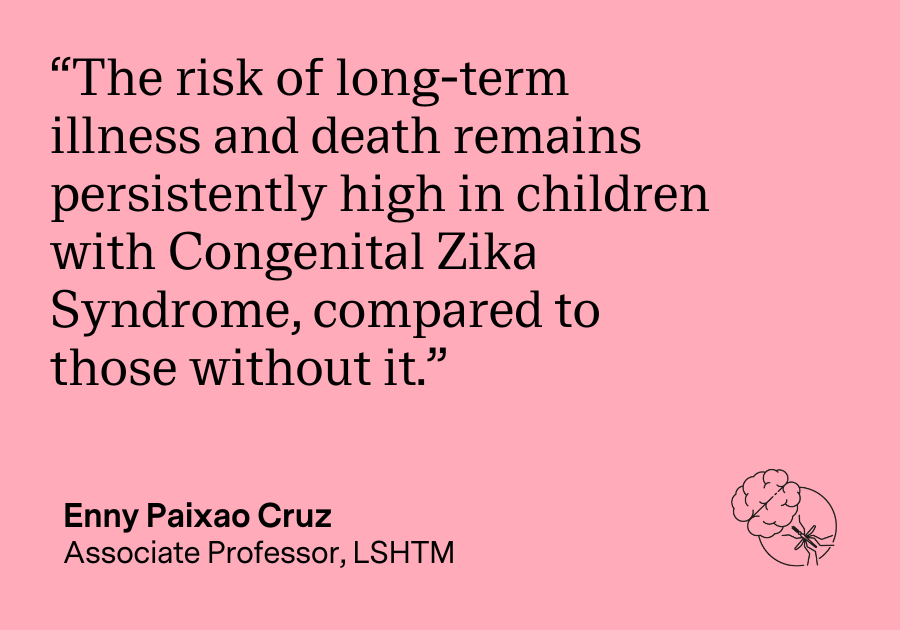Zika virus and the long-term impacts of birth abnormalities on affected children
3 March 2025 London School of Hygiene & Tropical Medicine London School of Hygiene & Tropical Medicine https://lshtm.ac.uk/themes/custom/lshtm/images/lshtm-logo-black.png
Zika virus spreads to people primarily through mosquito bites and can also be transmitted person-to-person through sexual contact. To date, 89 countries and territories have reported evidence of Zika virus infection. While most people have only mild or no symptoms if infected with the virus, sometimes infections during pregnancy can be transmitted across the placenta to the foetus. This can disrupt foetal development, resulting in structural malformations, such as microcephaly, a condition in which children develop abnormally small head circumferences, and other functional impairments - collectively known as Congenital Zika Syndrome (CZS).
Researchers at the London School of Hygiene & Tropical Medicine (LSHTM) have been studying Zika virus for nearly a decade. Following the first reports of an increase in the frequency of newborns with microcephaly in Northeast Brazil in 2015, analyses conducted by researchers at LSHTM and partners across Brazil confirmed a link between the microcephaly epidemic and Zika virus infections.
Since that landmark study, published in The Lancet Infectious Diseases, children born with CZS are growing up. An interdisciplinary team of researchers at LSHTM and across Brazil are partnering together in the LIFE Zika (Long-term Impacts for Families affected by the Epidemic of Zika) Study to understand the health and social consequences of Zika virus infections during pregnancy.
Enny Paixao Cruz, Associate Professor at LSHTM, has been studying the impacts of CZS in the first five years of life, looking at the likelihood of children with CZS requiring hospitalisation and the risk of children with CZS dying before the age of five.
This research found that children with CZS were three to seven times as likely to be hospitalised as a child without the syndrome, and they are more likely to experience longer hospital stays in the first four years of life.
Children younger than five with CZS have 13 times higher risk of death compared to those without the syndrome. At five years old, a child with the syndrome had approximately 30 times greater risk of death from respiratory system diseases, 28 times greater risk of death from infectious and parasitic diseases and 57 times greater risk of death from nervous system diseases compared to those without the syndrome.
Enny said: "The long-term impact of Congenital Zika Syndrome is still not fully understood. However, it is clear that the risk of long-term illness and death remains persistently high in children with the syndrome, compared to those without it."
Elizabeth Brickley, Professor of Epidemiology & Planetary Health and Co-lead of the LIFE Zika Study, said: “Although global Zika virus transmission currently remains low, sporadic outbreaks continue to be detected, and there is a persistent risk that a new large-scale epidemic of Zika could emerge.”
In 2024, India reported more than 150 confirmed cases of Zika virus disease, most of which were detected in the Pune district of Maharashtra State.
“Vaccines remain our best tool for preventing infectious diseases. As there are currently no licensed vaccines to prevent Zika virus infections, I would strongly urge policymakers to support biomedical research and development that can deliver safe and effective vaccines and therapeutic agents to reduce the risks from Zika virus infection during pregnancy.
“Surveillance for new clusters of Zika virus infections, cases of Guillain-Barré Syndrome, and congenital abnormalities also continues to be essential for guiding rapid public health responses.
“As a global public health community, it is critical that we remain committed to our international partnerships and to maintaining open lines of communication regarding infectious disease threats like Zika.”
Last year, reports of an Oropouche outbreak across South America raised concerns about its potential harmful effects on unborn foetuses. The oropouche virus is spread through bites from infected midges and some mosquitoes, and can cause similar symptoms to Zika infection; including fever, headache and muscle aches. Thinking about the need to deliver a rapid research response to better understand mother to baby transmissions of Oropouche, researchers at LSHTM and partners from Brazilian institutions reflected on the key lessons learned in the past decade of Zika research.
Highlighting the need to strengthen surveillance and create an environment of collaboration, the authors emphasised the importance of utilising the expertise of local researchers, public health practitioners and affected communities - those who can provide unique insights from outbreak settings.
Looking ahead to how these learnings can impact future research of Zika virus and CZS, Jhulia Dos Santos, Research Assistant at LSHTM, said: "Research on the long-term impact of congenital Zika infections will be improved by meaningfully engaging in two-way transparent communications with affected families throughout the research process.
“This requires researchers to be adequately supported by funders and institutions, and to persistently challenge knowledge hierarchies within academia, moving towards valuing families’ knowledge and views.”
The LIFE Zika study has been making efforts to work closely with advocacy groups of families affected by Zika, which have been protagonists in the struggle for rights. Germana Soares, President of the UMA advocacy group (União de Mães de Anjos/Mothers of Angels) and Vice-President of UniZika, said: “I may not understand technical, very specific things, but I understand my reality, what I need. I understand the reality of my sisters in struggle.”
Working with parents and caregivers of children with CZS, the LIFE Zika study can gain valuable insights into individual and collective experiences of affected children and families, which could support in guiding the planning of research and health and social care for children with CZS.
If you enjoyed this article and would like to build a career in global health, we offer a range of MSc programmes covering health and data, infectious and tropical diseases, population health, and public health and policy.
Available on campus or online, including flexible study that works around your work and home life, be part of a global community at the UK's no.1 public health university.